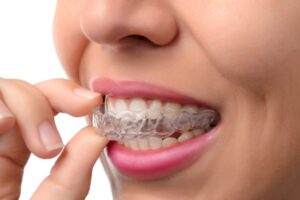The TMJ is a tiny joint that can induce big pain. The temporomandibular joint (TMJ) sits right behind a central facial nerve, the focal point of a network of nerves that cross and connect throughout the face, head, and neck. So, when the TMJ is overstimulated, discomfort can trickle through the muscles in the mouth, eyes, forehead, cheeks, tongue, teeth, ears, throat, neck, and even upper back.
For most people, the TMJ can easily slip back and forth. But for others, Dr. Mina Levi targets the source of TMJ pain and then prescribes treatment. Book an appointment at California Dental Innovations in San Francisco if you feel persistent tenderness in your jaws, teeth, head, and neck. Here, we dig deeper and explain how the small yet mighty temporomandibular joint affects other body parts.
Jaws
Since the TMJ joints on either side of the face connect your lower jawbone to your skull, one of the first signs of TMJ disorder is a tense jaw that pops, locks, or spasms. A tense jaw can make eating, chewing, speaking, swallowing, and even yawning uncomfortable.
When your TMJ becomes agitated due to stress or overuse, it can restrict jaw movement. For example, your jaw may lock or pop when you open your mouth. Additionally, TMJ may showcase swelling, soreness, or muscle spasms in or near the jaw.
Teeth
Does TMJ disorder cause dental misalignment, or does your dental alignment cause TMJ disorder? Honestly, it’s a “chicken or the egg” scenario. However, TMJ disorders tend to cause further damage to your teeth. For instance, the alignment in your top or bottom teeth may shift, causing toothaches and bruxism.
Bruxism is the habit of grinding and clenching the jaw. Sometimes, bruxism accompanies TMJ disorder because of the imbalance and soreness of the jaw muscles. Grinding your teeth can be a way to offset the extra stress and pain.
Head
Is your TMJ pain all in your head? Occasionally, TMJ dysfunction can cause strange, painful symptoms that are overlooked. A misaligned TMJ causes a ripple effect throughout the body and can cause the upper spine near the skull to become out of place. Even a minute misalignment puts immense strain on the nerves and tissues, resulting in:
- Headaches and migraines
- Dizziness and vertigo
- Ear pain, fullness, and ringing
- Brain fog and other cognitive challenges
Neck
Surprisingly, neck pain is a common complaint that complements TMJ disorder. As a matter of fact, experts estimate that 70% of neck complaints can be traced back to temporomandibular dysfunction. As inflammation spreads from the TMJ, it moves along nerves, muscles, and blood vessels in and around the head and down to the neck.
However, TMJ-related neckaches tend to worsen when the jaw moves and become less intense when the jaw is at rest. This helps medical professionals distinguish between TMJ tension aches and other disc problems. Plus, the neckaches usually impact the same side that the jaw is affected by TMJ—which can affect one side or both sides.
Are you feeling discomfort in one of the TMJ pain areas?
Although minor TMJ soreness may go away without treatment, people who feel pain in their jaws, teeth, head, and neck should consider evaluation to prevent or avoid potential health issues. Dr. Mina Levi offers non-invasive yet impactful treatments such as TMJ exercises, mouthguards, and Invisalign® to treat TMJ problems. Talk with our team to learn more about your TMJ treatment options by messaging us online or calling 415-513-5066.










